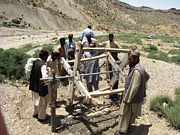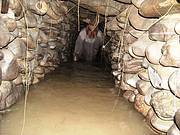Of pearls in the sand – reviving a centuries-old water management system in Pakistan
10 May 2014 | Article
Pakistan's Balochistan Province presents a unique situation in terms of both the environment and its socio-political context. Many traditional land use practices exist, including nomadic herding but the region faces a range of challenges including extreme aridity and droughts that are expected to increase with climate change.
The area is also being embroiled in several internal and external conflicts. This situation presents significant challenges for sustainable development.
For generations, traditional karez systems have provided the only source of water for irrigation and human needs in the remote, mountainous drylands of Balochistan. Karez systems work by tapping into naturally occurring ground water and are sustainable because they rely on the natural water flow. Communities have developed informal institutions to build, maintain and share water from karez systems.
The film “Of Pearls in the Sand” unveils the story of a small town in the heart of Balochistan – Qila Iskan Khan – where the residents were forced to migrate, leaving their ancestral land behind due to lack of water and prolonged drought, until IUCN Pakistan intervened with the community’s help to implement an Integrated Water Resources Management (IWRM) model. The productivity of karezes increased fourfold after applying the IWRM related interventions.
The karez system was almost completely abandoned in favour of the tube wells, thereby losing also the traditional system, practices and knowledge. The results of groundwater mining in Balochistan are evident: the rise in the number of tube-wells over the past three decades along with their Government subsidization for agricultural use, has led to indiscriminate extraction of groundwater resources. Consequently, there has been a steady fall in aquifer water levels, many of the karez systems have dried up, clogged up or collapsed.
The consequences for the communities that depend on them have been disastrous. In the documentary the villagers report that “In just 30 years we’ve extracted all the water from our ancestors”. In Quetta District alone about 2,842 ha (21.5% of total area in agricultural use) remains irrigated by karezes. Climate change is expected to contribute to a decrease in received precipitation and to a further reduction of aquifer replenishment and of available surface water resources, thereby accelerating drought. Yet demands for and extraction of water are increasing.
IUCN Pakistan has been working on getting people to invest in the karez system again as a sustainable means to tap groundwater resources. In the community everyone individually contributes towards the collective good for example, when installing PVP pipes to reduce water losses, and receives a fair share.
Community water rights were well established and respected, and are now being revived. Water quantity and quality issues were addressed together, also taking into account gender differentiated water usage. Through the project with an investment of 2,3 million Rupees, the community has earned 14,2 million Rupees in just one year. This was achieved through improvements in water management, demonstration of more efficient water usage techniques and communities again taking up agriculture on their lands. Therefore, large contributions to food security and climate change adaptation have also been achieved.
Rehabilitating the karezes is just the beginning of IWRM. In this approach, amongst other interventions, communities have been educated on the need for separating water usage areas and on water management, water storage facilities have been constructed, elbow structures designed to improve rainwater infiltration, and plant nurseries established. Overall the maintenance of healthy watersheds is at the centre of IWRM, which has been successfully demonstrated as a way of implementing sustainable development at the local level.
For more information:
Please visit www.iucn.org/pakistan and contact Miriam Kugele: Miriam.kugele@iucn.org




